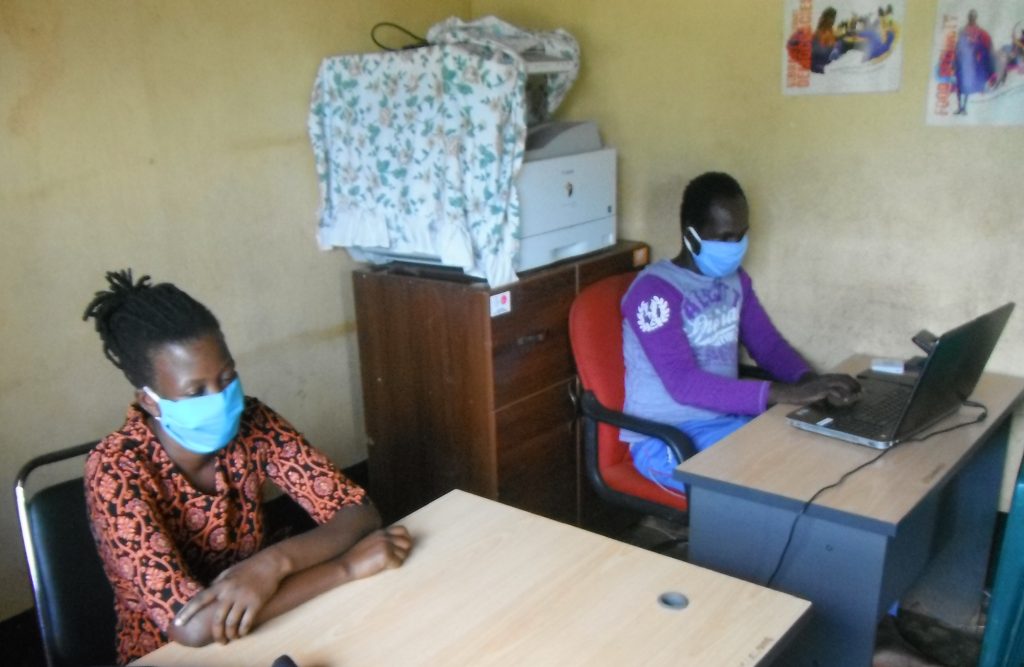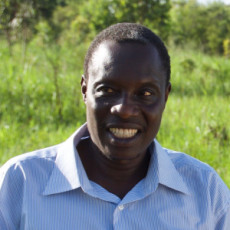
Face masks and social distancing at the GDPU: Patrick’s colleagues Emma and Faruk observe safety pecautions.
Globally, nearly 12.2 million people have been affected, by COVID-19, with the death toll exceeding 552,000. As of Wednesday, July 8, 2020 Uganda had reported 977 with no deaths. But it is clear that the impact of the pandemic is worse for persons with disabilities (PWDs), who are the most vulnerable people.
PWDs constitute 12.4% of the population of Uganda. As a result, any intervention and strategy that does not include them will in the long run prevent the elimination of COVID 19. Nursing homes may be held liable for infection because of their daily life challenges owing to their condition.
Lock-down has been undertaken by most countries of the world including Uganda for the right reasons. All over the world, the deadly Coronavirus has affected every section of the community.
But in Uganda it has hit vulnerable members of the community, particularly PWDs. The government has made no effort to design specific standard operating procedures (SOPs) to take care of the special needs of PWDs. As a result, people with disabilities have to adjust to the general SOPs put in place to cater for the general population by the ministry of health.
The challenge to PWDs
Some measures undertaken by the Uganda Government to contain the spread of COVID-19 pandemic are particularly difficult for people with disabilities.
For example, everyone is required to observe social distancing of at least four metres. But this is difficult for persons with visual impairment since they have to depend on support from another person while carrying out their daily duties.
Inaccessible health centres and facilities also make it difficult for PWDs to access the services due to limited ramps. Some of the ramps do not meet the accessibility standards in the Building Control Act. This makes it hard for persons with mobility to access health services, especially during this pandemic with stringent guidelines in place.
The lack of sign language interpreters at health centres make it hard for deaf people to access proper health facilities since they are not able to effectively communicate with the health workers. Under the law, Resident District Commissioners (RDCs) should be called on by phone in case of an emergency. But this also presents an obvious challenge for certain categories of PWDs, such as the deaf.
As a result, these categories may go unattended, worsening the fight against the virus. This situation would be helped if sign language interpreters could accompany them in such circumstances.
Finally, there are no standard operating procedures on how to deal with vulnerable members of the public such as mothers and pregnant women with disabilities in the government’s COVID-19 response document.
Recommendations
My personal recommendation from living with disability is that tackling the fight against COVID 19 on people with disabilities requires a deliberate inclusion approach by all stakeholders. The following principles, which adhere to a human-rights approach to disability, need to be adopted:
Awareness of disability and its implications, provide information regarding disability to health professionals, and COVID 19 task force to ensure there is up-to-date knowledge on prevalence and impact of disability. Also, people with disabilities should be asked to build awareness about COVID 19 as they are much at ease to freely interact with their peers. Encourage awareness-raising by disability service providers and disabled peoples’ organizations.
Participation is another core principle. Build relationships with people with a disability, ensure direct consultation with PWDs to identify their health-related barriers and develop strong linkages between health and disability stakeholders.
Comprehensive accessibility: by removing physical, communication, policy and attitudinal barriers. This may vary between individuals. Not all people who are blind will have been taught Braille. Likewise, not all individuals who are deaf or hard of hearing will have sign language skills or have the capacity to use large print, Braille, pictorial, audio and sign language. This should be based on individual requirements.
Mainstreaming disability into COVID 19 standard operating procedures (SOPs) is one way to ensure that many of the barriers experienced by people with a disability are removed and the right of PWDs to health is achieved.
This I believe will go a long way in reducing the burden of COVID-19 on people with disabilities in a low-resourced country like Uganda.
Posted By Patrick Ojok
Posted Jul 15th, 2020


4 Comments
Alexandra Mayer
July 17, 2020
Patrick, your post illuminates well the disproportionate burden of Covid19 on PWDs and lays out clear and precise recommendations. Why do you think governments across the globe struggle to follow these guidelines in response to Covid19 and more broadly?
Iain Guest
July 18, 2020
Patrick – thanks for sharing your thoughts on this very important issue. You’re obviously right – now more than ever is the time to address the special needs of persons with a disability. But as you say, that is extremely difficult during the pandemic. My conclusion is that this makes GDPU’s work more important than ever. Also, I think you’re 100% right to focus on small projects (masks, soap etc) that produce clear benefits and can be expanded when the crisis passes. I hope we see more blogs from you!
Brigid
July 20, 2020
Patrick, it was really a pleasure to learn more about the work you do with GDPU. (I have heard a little from AP’s Peace Fellow Wilson, but I loved hearing directly from you). Your blog has been very impactful on me, and after reading it these last few days I have begun to think about the way persons with disabilities are talked about and cared for (not just in the pandemic). More so, I am reflecting how I personally perceive PWDs, and this is something I hope to continue to think/reflect/act on. Surely, the questions and recommendations in your blog are not limited to Uganda but need to be considered in every society/country/community. Thank you for this reflection, and I hope to read more/continue to learn more about you!
Beth Alexion
July 24, 2020
Patrick, thank you for sharing this piece. Your points about the disproportionate challenges COVID responses pose to persons with disabilities are very important, and I agree with Brigid’s comment that these challenges and recommendations need to be reflected on and improved far beyond just Uganda. I hope one day accessibility will no longer be an after-thought or perceived of as a “burden” for policy-makers and others, and I’m sure the work you and PDPU are doing will further that goal. Thank you for sharing, and look forward to continuing to follow your work!